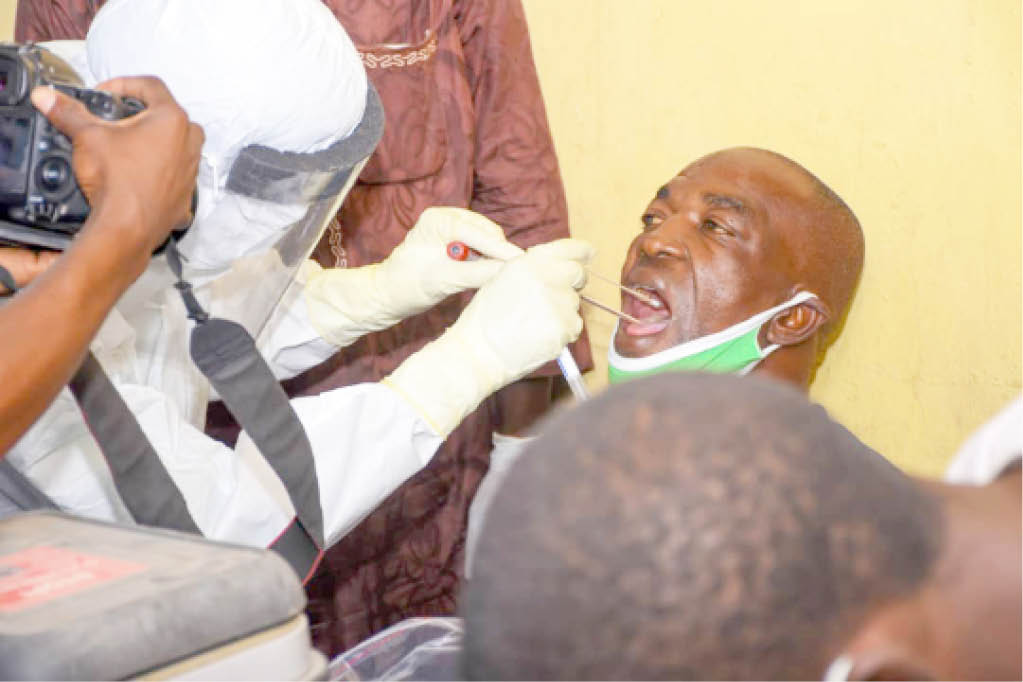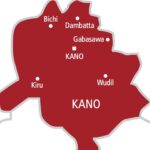From recording hundreds of COVID-19-related deaths within five weeks, Kano State, with its about 20 million population, posted a total of eleven new cases from June 21-27, according to the Nigeria Centre for Disease Control (NCDC).
The progressive drop in the number of confirmed cases in the state despite additional testing centres has continued to raise questions on whether the state has successfully flattened the curve of the virus, especially after the state government lifted the ban on viewing centres.
- African group hails Kano for leading COVID-19 test in Nigeria
- Buhari to flag off $2.8bn Ajaokuta-Kaduna-Kano pipeline project Tuesday
While the federal government said, at least, 587 COVID-19-related deaths were recorded within five weeks in the state, the state government insisted that only 255 COVID-19-related deaths were recorded within the period.
And in spite of the warning by the federal government about the imminent danger ahead in the current war against coronavirus in the country, the recent actions of the state government, particularly with regards to enforcement of restrictions have continued to raise questions about the situation at hand.
It would be recalled that Kano State confirmed its first case of COVID-19 on April 11 and the geometric increase in the number of confirmed cases soon saw it leapfrog the Federal Capital Territory to the second position on the log of states with the highest number of cases.
Worried about this increase in the number of confirmed cases and mass deaths, the state government swung into action to curtail the spread of the disease in the state by imposing restrictions on movements, social gatherings, religious activities and even businesses.
But after about six weeks of the lockdown and a series of agitations especially from religious groups, the government lifted the ban on religious gatherings to allow the Muslim faithful to observe Eid-il-Fitr Sallah prayers.
From then things started changing as markets and other essential service providers, including private sector business outlets started operations and most recently, football viewing centres.
‘Numbers don’t lie’
Speaking with Daily Trust, Dr. Sabitu Shuaibu Shanono, the deputy coordinator of the state’s COVID-19 Response Team, said going by the recent statistics, “the number of cases has drastically reduced; the number of samples we are testing has increased while the number of positives has reduced.
So, it means that we have flattened the curve.”
On the testing capacity, he said based on the laboratories in the state, the testing capacity is over 500 per day.
“We are doing community testing and last Thursday, we were in Kumbotso, Nasarawa and Gwarzo and we were able to take over 900 samples,” he said, adding that with this, it was expected that the number would be high but that the positivity rate had dropped.
This position was confirmed by some of the cemetery attendants who spoke to Daily Trust when our correspondents visited some graveyards within the state capital.
They said the situation has stabilised with maximum daily death record at seven compared to over 40 per day between April and May.
But they said despite their exposure to corpses, they have never received any personal protective equipment.
Compliance to safety precautions
Since the reopening of football viewing centres in the state, Daily Trust observed that measures meant to combat the spread of the pandemic are being jettisoned.
The state government reopened football viewing centres on the condition that the viewers must observe the COVID-19 protocols, which include use of face masks, washing of hands and maintaining social distancing.
However, a visit to some of the viewing centres revealed total disregard to these safety measures as viewers go about their businesses without face masks.
Some of the viewers said they found use of face mask inside the viewing centre to be very inconvenient.
According to Mas’ud Ibrahim, “On the first day of resumption, we all complied with the order and people washed their hands outside, wore face masks and maintained some little distance even though not much.
“But from that day, I don’t wash my hands anymore.
“I only carry a face mask and if I pass through the gate, I will remove it and put it inside my pocket.”
Most of the residents observed that the attitude of the people towards the prevention protocols against the disease remains the same with when the cases were rising, as the majority go about their businesses without recourse to social distancing, use of face masks or any other preventive guidelines.
According to Comrade Nafiu Gurka: “This disease is not different from ordinary catarrh and cough; they just gave it name to sound different from what we know for either political or economic purposes.”
“I am not bothered about it that is why I don’t use the face mask people are shouting about.
“What concerns me is the lockdown which has deprived people of their means of livelihood and subjected the poor masses to untold hardship,” he added.
Modu Wakil, a tax officer, was also skeptical about the figures being communicated as daily confirmed cases in Kano.
He said, “If the figures are correct I doubt the validity of the tests being conducted in the state.
“But if the tests are correct I am very sure the disease does not have a significant impact on our health.”
This general perception of the disease, Daily Trust observed, has hampered the process of quick diagnoses over some time in the state.
But Dr. Shanono noted that in terms of sensitisation, the media, the state government and other partners, according to him have been doing well.
He insisted that from his observation, markets and football viewing centres have been complying with the precaution measures, especially as regards to the use of face masks.
“I was in Sabongari market and nobody was allowed to go in without a face mask.
“And I saw a lot of viewing centres with the notice ‘No entry without face mask’.
“So, that tells you that the level of compliance is good, though it may not be 100%, but everyone is trying his best and we will reach that level where compliance will be maximum,” Dr. Shanono added.
House-to-house sample collection
The state governor, Dr. Abdullahi Umar Ganduje, had ordered house-to-house sample collection of suspected COVID-19 patients within the eight metropolitan local government areas of the state early June.
The house-to-house exercise began in some selected areas within the metropolitan Local Government Areas such as Tarauni, Nasarawa, and Kano Municipal, where it was revealed that most of the confirmed positive cases of COVID-19 were concentrated.
A visit to some of the designated areas mapped out for house-to-house sample collection revealed that when compared with the population of the areas, not much has been done as some of the residents feigned ignorance of the exercise.
At Dorayi Babba area of Gwale local government where Governor Ganduje flagged off the exercise two weeks ago, our correspondents gathered that only a few people turned out for the test.
Some of the residents who spoke to Daily Trust said the exercise was conducted at the Mai Unguwa (ward head) premises against the house-to-house idea earlier communicated to the public.
According to Malam Abdulhamid Iliya Habib, “The health officials worked for a few days amidst poor turnout from the residents, especially among the adults.”
“Most of the people that presented themselves for tests were people below 15 years,” he added.
Habib said he was discouraged from sending his family for the test because he was worried that his neighbours would think he participated in the testing because of the toilet soap being shared by the health officials to participants.
The house-to-house testing, according to the deputy coordinator of the state’s response team, “is a strategy that means we will send health care workers to move from house to house to ask them to volunteer.
“It is actually a volunteer system.
“It is done in an open area under a tent.
“So, I can say that it was opened for everyone to come and there is nothing like it was done in the Mai-Unguwar’s house.”
Many still in disbelief
Malam Aminu Musa, a grocery seller in the area, like many others Daily Trust interacted with, said he does not believe in the preventive protocols highlighted by the authorities.
“I had to believe that there is coronavirus because people want me to, but for the preventive measures, I don’t think I need any because as a Muslim we already have in our mode of worship practices that deal with personal hygiene.
“My ablution suffices for hand sanitization and for the face mask I only use it when going to market to avoid embarrassment,” he added.
Malam Aliyu Dauda, the community leader of Unguwan Wambai, estimated over 500 households in the area, out of which he said only about a hundred people gave their samples for testing.
He said, as of last week, no one who had given his samples for testing had returned positive.
For this, the state government’s response team observed that it was expected that when something novel comes, some people might lag behind in trying to understand what is going on, but he assured that the majority of the people have understood what the coronavirus is all about and they have been taking precautions issued by the state government.
‘Decreasing cases not something to celebrate’
Dr. Usman Bashir of Aminu Kano Teaching Hospital (AKTH) stated that the reduction in the number of confirmed COVID-19 cases in the state should not be celebrated for now.
“The reduction in the number of recorded cases of COVID-19 in Kano State is not anything to rejoice about, because people don’t go for testing and it’s only when the testing capacity and the ability of the testing centres are improved we can say we are winning the battle against the virus.
“Moreover, many people in the state lack proper awareness due to poor campaign processes on the pandemic and its existence, thereby making it difficult for them to subject themselves to testing or sample taking processes,” he said.




